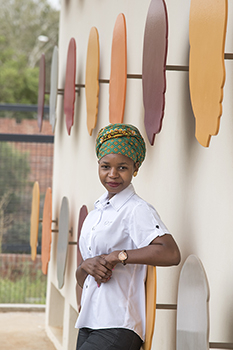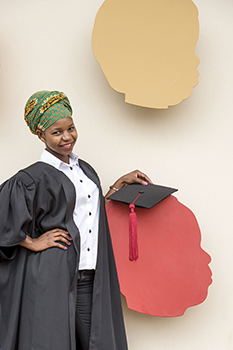Latest News Archive
Please select Category, Year, and then Month to display items
13 August 2024
|
Story Anthony Mthembu
|
Photo Sibahle Dayimani and Amandla Kulu
 Prof Peter Roseel, Managing Director of Management Consulting and Research – a spin-off of the Catholic University of Leuven in Belgium; and Prof Nicolene Barkhuizen, Director of the UFS Business School.
Prof Peter Roseel, Managing Director of Management Consulting and Research – a spin-off of the Catholic University of Leuven in Belgium; and Prof Nicolene Barkhuizen, Director of the UFS Business School.
The Business School at the University of the Free State (UFS) hosted Prof Peter Rosseel, Managing Director of Management Consulting and Research – a spin-off of the Catholic University of Leuven in Belgium – for a guest lecture during his visit to the UFS Faculty of Economic and Management Sciences (EMS).
The guest lecture took place on 19 July 2024 in the Business School Auditorium and was attended by academics from the UFS.
Reflecting on the lecture
The lecture presented by Prof Rosseel focused on how combining strategy, strategy implementation, culture transformation, leadership, and learning successfully leads to sustainable growth, creates engagement, and delivers tangible results. Throughout the lecture, Prof Rosseel spoke about how experts tend to make bad leaders and therefore stop change from happening within an organisation. In fact, he highlighted that, “Experts stop change from happening within the workplace because experts, by definition, look through the eyes of their expertise, but you cannot reduce the world to different forms of expertise, as it is holistic.” As such, he argued that to change an organisation, one must see things from the point of view of others.
Furthermore, Prof Rosseel delved deeper into the hierarchical operating model within organisations. He indicated that the above model should be one community within organisations; however, unfortunately it is not. This is because organisations are made up of several departments such as finance and human resources. As such, he regards these departments to be silos that could prove to be detrimental to organisations, as each silo can create its own culture as opposed to an organisational culture. These are some of the points he discussed throughout the lecture.
After the lecture concluded, the audience had the opportunity to engage with Prof Rosseel on his viewpoints. In fact, Lyle Markham, Academic Head of Department and Lecturer in Industrial Psychology at the UFS, was one of the audience members and described the lecture as insightful.
It takes a village to raise a child
2016-06-13

Valentino Ndaba
Photo: Sonia Small
(Click on CC for subtitles)
Video
Student Bursary Fund Campaign booklet (pdf)
Donate
Student Bursary Fund Campaign launched: #FundAFuture and make a difference
Motho ke motho ka batho. A person is a person through others
Want to make a difference in the world? Here is how
South Africa has one of the most spectacular coastlines in the world. Take the ribbon of golden beaches sweeping along the shores of KwaZulu-Natal, for instance. But just beyond the kiteboards dappling the ocean and fields of swaying sugarcane lies one of the largest informal settlements in the province: Amaoti. A place where barefoot children are skipping alongside poverty, and violent crime incinerates hope.
Nonetheless, that place could not keep Valentino Ndaba from graduating at the University of the Free State (UFS), and setting her sails for post-graduate studies.
A village
It takes a village to raise a child. This African proverb ripples across Valentino’s life story. “My gran always used to say education is your eternal bread. She still says it to this day. She has always instilled in me the importance of education,” Valentino smiles. Her grandmother has been but one of several champions in Valentino’s life.
Maalthee Dayaram – a teacher at Brookdale Secondary School that Valentino attended – noticed a budding talent in the young girl’s writing. With dedicated attention and ceaseless encouragement, Mrs Dayaram helped pave the way for this young writer. “You might be talented and have potential, but having someone actually believe in you and tell you that you have potential makes such a difference,” Valentino says. “I fell in love with writing, and had an idea that writing might be my future.” Dire economic circumstances threatened to snuff out any sparks of hope from that fragile future, though.
Aided by Lungisani Indlela (a non-profit organisation that provides children in the Amaoti area with school fees, uniforms, shoes, etc), Valentino clung to faith in the power of education. With unwavering single-mindedness, she consistently earned top grades.

Photo: Sonia Small
Not if, but when
“Dreaming of my future, my gran would always say to me, ‘when you go to university’ or ‘when you have graduated’, this and that will follow.” Her gran’s words proved to be prophetic. As the final matric results were published in early January 2012, Valentino received a phone call that would change her life irrevocably.
That call came from the well-known South African humanitarian, Tich Smith. “Would you be willing to go to university in another province?” Smith asked. Never having travelled beyond her immediate surroundings, Valentino’s brave answer was: “Yes.”
A few days later, she walked onto the Bloemfontein Campus of the UFS.
Changing futures
Valentino proceeded to obtain a BA degree in Media Studies and Journalism in 2014. She has now set her sights on an honours degree, and envisions pursuing a Master’s degree in creative writing overseas.
“Without the support I received, I would have been stuck without a future,” she says. “University has shaped me into a better version of myself. I’ve grown intellectually, spiritually, and emotionally.”
You can bring about the same change for other students in need. By contributing to the UFS Student Bursary Fund Campaign, you can change the future not only of individuals, but of communities and of our country as well.
The impact of your financial support reaches far beyond its monetary value. It pulls families from poverty. It sends forth experts and visionaries into the world. It sets in motion a culture of giving.
Visit our Giving page for ways to contribute.